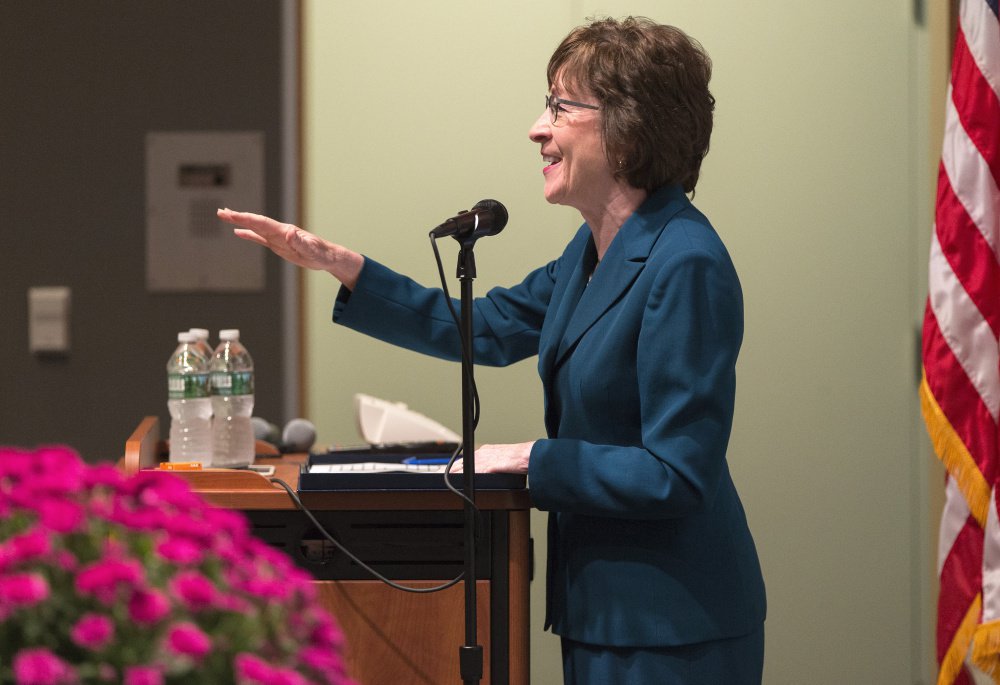Before the Senate’s August recess, Sen. Susan Collins was riding high. She was a celebrated national figure thanks to her central role in killing unpopular and ill-considered health care legislation. On returning to Maine, she was greeted by spontaneous applause in the airport terminal. She deserved it.
She withstood a great deal of pressure from her party and the president. Of the three Republican senators who opposed the final “skinny repeal” of the Affordable Care Act (also known as “Obamacare”), she was the earliest, the most consistent and the most articulate in stating her objections. And Collins did it for the right reasons — to prevent partisan pursuits from harming some of the most vulnerable citizens in her state and the nation. Well done.
Is there a deeper lesson that Collins can draw from this experience? One thing Collins did not do during the health care debate was admit to making a mistake: voting against the Affordable Care Act in the first place.
Her words and votes these last few weeks reveal that she does think her original “no” vote was wrong: Obamacare has succeeded in many of its most important goals, and improved the lives of millions. A repeal would be disastrous. But for Collins to say so clearly could have real political value, both in the continuing fight over health care, which could culminate in another high-stakes vote next week, and with other issues of importance.
The successes of Obamacare are something that Collins, an expert in health insurance, probably expected back in 2010 when she voted against it. Obamacare included many conservative ideas — in fact it was built on a “market-based” scheme developed by the conservative Heritage Foundation and enacted in Massachusetts under its Republican governor, Mitt Romney. Collins probably had a few ideas to make it even better, and she was invited to offer them.
But Collins was under partisan pressure back then, too. Knowing that the Democrats had 60 votes to pass the bill, she was persuaded to vote “no,” thus giving Republicans the cudgel they so desperately wanted: the chance to say that the bill passed without a single Republican vote. In helping provide opponents of Obamacare with one of their favorite talking points, she helped endanger the very law she rescued last month.
In these different political times, a simple and clear statement that “I was wrong, we Republicans were wrong — Obamacare was a step in the right direction” would go a long way in helping Obamacare survive the next wave of efforts to undermine or repeal it.
Other important initiatives from the last eight years are under attack, and a similar approach from Collins might be effective. One example is the international agreement to prevent Iran from acquiring a nuclear weapon. That deal has worked. Inspectors and the international community have confirmed and certified that Iran is holding up its end of the bargain. And like Obamacare, the international accord on Iran is endangered under Trump. In his speech to the United Nations this week, he strongly implied that the U.S. would abandon the deal, despite the evidence of Iran’s compliance.
The Iran deal is another case where Collins opposed an initiative led by Barack Obama (she condemned the agreement on the floor of the Senate in 2015), along with the rest of her party, knowing her vote would not change the outcome. And it is another case where the new political circumstances offer a drastic change of perspective.
Collins has shown that she can sway the debate regarding highly partisan issues, no matter her previous votes. A clear defense of the Iran agreement could, as her defense of Obamacare did, change the national debate and avoid a move that could trigger a crisis – in this case, a race toward a nuclear standoff in the Middle East.
It is not fun to admit to mistakes. But a blind loyalty to votes that made some sense under the previous administration can lead to real disasters in the new state of politics today.
Partisan loyalty held sway for Collins over the eight years of the Obama administration, in part because partisan votes could “send a message” without having tangible outcomes. In the recent Obamacare debates she was right to think differently now that her words and her vote are so much more consequential. It has enhanced her stature and reputation. She should keep it up.
Brian Duff is an associate professor of political science at the University of New England’s Biddeford campus.
Send questions/comments to the editors.



Success. Please wait for the page to reload. If the page does not reload within 5 seconds, please refresh the page.
Enter your email and password to access comments.
Hi, to comment on stories you must . This profile is in addition to your subscription and website login.
Already have a commenting profile? .
Invalid username/password.
Please check your email to confirm and complete your registration.
Only subscribers are eligible to post comments. Please subscribe or login first for digital access. Here’s why.
Use the form below to reset your password. When you've submitted your account email, we will send an email with a reset code.